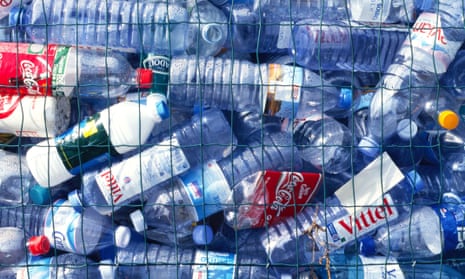In a memorable episode of Seinfeld, two characters hatch a plot: instead of returning bottles in New York for a 5-cent refund, round up a load of containers and run them to Michigan, where the return is double, at 10 cents each.
In reality, the ploy – returning bottles purchased outside of Michigan to capitalize on the refund – is illegal under the state’s bottle deposit law. And a Michigan resident is finding out just how steep the penalties could be.
Brian Everidge, who is accused of attempting to “return” more than 10,000 bottles from other states, faces up to five years in prison for one felony count of beverage return of non-refundable bottles.
The incident dates to late April, when a Michigan state trooper pulled over Everidge – who was driving a rented Budget box truck in Tyrone Township, Michigan, about 40 miles north-west of Detroit – for speeding.
The officer, Clifford Lyden, testified at a court hearing on Thursday that Everidge’s truck was filled with plastic bags holding thousands of aluminum cans.
“I don’t think you could have put another five or 10 cans in here,” Lyden said. “It was packed.”
Everidge indicated the cans were from Kentucky, the officer said, “and his intent was to return them; he just didn’t say where he was going to return them”.
Livingston County district judge Suzanne Geddis found on Thursday that there was probable cause that Everidge violated state law, court records show, and Everidge will go to trial.
William J Vailliencourt, the prosecutor for Livingston County, declined to comment, citing the pending trial. But he said his office “has never had a case like this”.
Everidge couldn’t be reached, and his attorney, Marcus Wilcox, declined to comment.
In court, Everidge’s attorney Marcus Wilcox argued the state improperly charged Everidge, according to the Livingston Daily Press & Argus. He said his client’s situation didn’t meet the legal threshold for “attempting” to deliver the bottles for the deposit refund.

“They caught him too early,” Wilcox said on Thursday. “He attempted to attempt to return the bottles.”
Legal experts said Wilcox’s argument was tantamount to a “law school exam question”.
“This is the kind of stuff you torture students with,” said Peter Henning, a Wayne State University law professor and former federal prosecutor.
The case will turn on whether Everidge’s conduct went far enough to say he “attempted the crime, rather than was he just thinking about it”, Henning said. “His lawyer is making this is a purely legal argument: ‘Yes, he had the bottles from out of state ... but he hadn’t gotten far enough yet. And therefore he has not committed a crime.”
“You can’t be punished for your thoughts ... the difference is between mere preparation and perpetration,” he said.
Wilcox’s argument, Henning said, wasn’t an easy sell. “If he was three miles over the Toledo border, maybe that works – but he’s 75 miles into Michigan. This is getting much closer to perpetration of the offense.”
Michigan’s bottle-return policy is revered among advocates, as it has the highest bottle deposit in the US, according to statistics from the Container Recycling Institute. (Seinfeld elevated it to public lore in a two-part episode called The Bottle Deposit). The institute’s website notes that Maine and Vermont’s laws provide a 15-cent deposit for liquor and wine bottles, and 5 cents for other beverages. California has a 10-cent deposit for beverages larger than 24oz.
Beyond the higher return, Michigan’s 10-cent deposit also made a significant dent in increasing bottle recycling in the state. Michigan has the highest redemption rate for bottles in the US, according to a 2013 state report. The deposit cost is tacked on to the price when an individual purchases a beverage. Retailers each year receive 25% of unclaimed deposits, while Michigan transfers the remainder to a trust fund held by the state’s environmental agency, which uses the money for various waste production and pollution efforts. In 2010, the unclaimed deposits totalled $17.3m, the state report said.
But the deposit rate has for years attracted scammers, particularly in communities along the state’s borders. State lawmakers have proposed legislation in recent years to crack down on smugglers, including additional criminal penalties.
The felony count prosecutors charged Everidge with carries the highest penalties under state law, at a maximum five years’ imprisonment and up to a $5,000 fine.
Henning said it was unlikely Everidge, if convicted, would receive a prison sentence. “This is not a serious offense, and putting him in jail costs the county money,” he said.
The state report, which analyzed proposed legislative changes to Michigan’s bottle bill, said prison incarceration in a state facility was about $35,500 per prisoner annually.
Henning said the bottle bill penalties for large volumes in Michigan were more commonly used against commercial vendors, not individuals.
“There have probably been a few,” he said. “I don’t think it’s commonly prosecuted.
“I know the statute says you could be prosecuted for more than 25 [bottles], but less than 100,” he added. “Unless you’re walking in with a license plate around your neck from Arizona, no dealer’s going to ask. Kroger’s not going to ask where my cans and bottles are from; they couldn’t care less.”
Though the case was an anomaly, he said, “this is why we have laws that he clearly intended to violate”.
Henning, noting how the effort would have netted Everidge roughly $1,000, alluded to the Seinfeld episode and concerns raised by one of the show’s characters about the cost of the ploy. For Kramer, it was gas money. For Everidge, it’s potentially far greater.
Either way, “Kramer was right,” he said. “The cost-benefit analysis just doesn’t work.”
